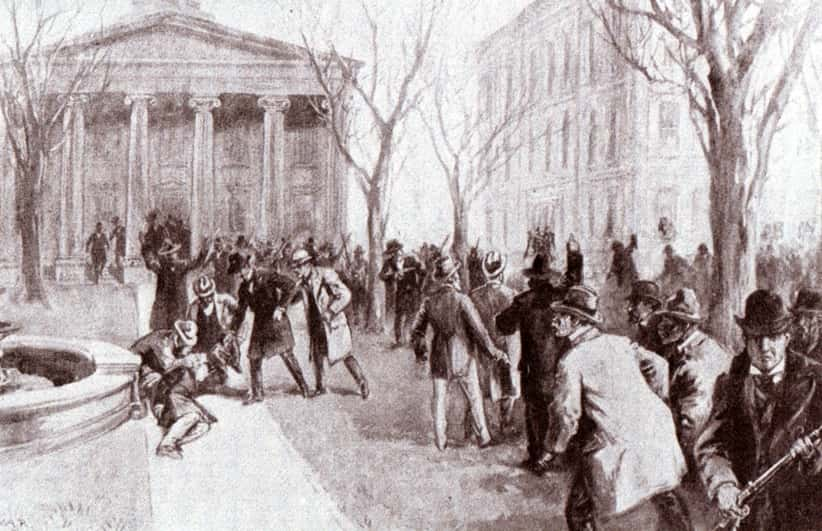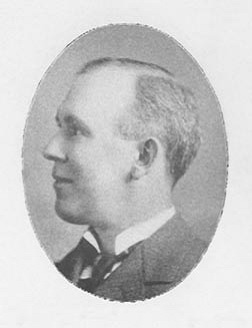Marshall County’s Connection to the
Assassination of Governor William Goebel
Written by Justin D. Lamb

Harper Weekly’s drawing of the assassination of William Goebel at the old state capitol building in Frankfort.
(Courtesy of Kentucky State Archives)
The Kentucky Gubernatorial Election of 1899 still remains one of the most contentious in Kentucky political history. Four years after the election of William O. Bradley, Kentucky’s first Republican governor, the Democrats nominated the controversial William Goebel in 1899 to take back the Governor’s mansion. After the passage of a controversial election law sponsored by Goebel in the Kentucky Senate, the Republicans accused the Democrats of a plan to rig the election and tension soon arose as the state leaned on the verge of civil war. As Kentucky’s political process seemed to be falling apart, one of Marshall County’s very own, Gus C. Coulter, was in the middle of all of the action.
The son of Benton attorney and Circuit Clerk C.C. Coulter, Gus C. Coulter was born shortly after the beginning of the War Between the States on August 15, 1861 in Benton. His family had strong political connections in western Kentucky and by the time of his 19th birthday, Coulter moved to Graves County where he was appointed deputy county clerk of Graves County. Coulter became very active in Graves County Democratic politics and was soon elected County Clerk for a term of four years and later served a term as Circuit Clerk. Soon after, Coulter began practicing law, and in 1885, he was appointed Chief Clerk of the State Board of Equalization by Governor J. Proctor Knott which was charged with tax administration and fee collection in the Commonwealth of Kentucky at the time.
Coulter’s political star continued to rise as he won the Democratic nomination for Kentucky State Auditor in August 1899 at the same controversial Music Hall Convention that nominated William Goebel for Governor. The ambitious Goebel had risen to power in the Kentucky General Assembly in the 1880s as a champion for labor causes and women’s suffrage and an opponent of the Louisville-Nashville Railroad which made him a hero in the eyes of the poor and working class throughout Kentucky.
Goebel had aspirations to be Kentucky Governor and following the election of William O. Bradley in 1895 as Kentucky’s first Republican governor, Goebel sponsored a controversial bill that would ensure Democratic victory in the 1899 election. The Goebel Election Law created a three-member state election commission, appointed by the General Assembly, to select county election commissioners. This system proved to be corrupt, allowing the Democratic controlled General Assembly to appoint fellow Democrats to the election commission thus benefiting Goebel. The law narrowly passed along sharp party lines and over Governor Bradley’s veto. After Goebel secured the Democratic nomination for Governor and the Republicans nominated William S. Taylor, the stage was set for a fiery political campaign.
After winning the Democratic nomination for State Auditor, Gus Coulter aligned himself with Goebel and faced Republican John Sweeney in the November General Election. Goebel and Coulter opened their campaigns in Mayfield on August 12, and as expected, the campaign was intense and often times nasty. There were accusations of potential vote buying and voter intimidation on both sides, and on Election Day, extra security was ordered throughout the state.
When the votes were tallied on election night, Republican William Taylor was declared the winner in the Governor’s race by a very slim margin and Goebel and his team soon met and decided to contest the election. The State Auditor’s Race was also contested with both Coulter and Sweeney claiming victory. It looked as if the electoral process in Kentucky was completely falling apart.
Emotions were running high and soon small bands of armed men, both Democrat and Republicans, began arriving in Frankfort to demand that there candidates be sworn into office. The Board of Election, created by the Goebel Election Law to decide any contested election, was soon called to decide the outcome of the governor’s election as anxiety in Frankfort began to intensify. When board finally met, the Democratic controlled board surprisingly voted in favor of Taylor much to the outrage of the Democrats. Taylor was inaugurated as Governor in December 1899. When news reached Marshall County that Taylor had been elected, Marshall County Republican Chairman J.W. Cole ordered the cannon on the court square fired in celebration.
Despite the decision made by the Board of Elections, Goebel carried on the fight claiming voter fraud and voter intimidation. He took his claim to the General Assembly, which had a large Democratic majority, and they formed a committee to investigate the election. Republicans throughout the state soon began to speculate that the committee would disqualify enough votes in order to make Goebel governor. More armed Republicans from Eastern Kentucky began to arrive in Frankfort to keep the election from being stolen. Armed Democrats from Western Kentucky began to arrive at the state capital and Governor Taylor, fearing bloodshed, ordered the men home, but few complied.
The crisis came to head on January 30, 1900 when Goebel was struck down by an assassin’s bullet in front a large crowd on his way to the Old State Capitol Building in Frankfort. As a staunch Goebel supporter, it is quite possible that Gus Coulter was in the crowd when Goebel was shot.
As soon as the contest committee learned of Goebel’s shooting, they met in Frankfort’s city hall and voted that Goebel had received the most votes in the election and ordered his installation as governor. Following the vote, the Democrats rushed to swear Goebel in as Governor as he lingered on the edge of death. With the turn of events, Governor Taylor declared a state of insurrection and the state militia was quickly called out. Goebel eventually died on February 3, 1900 and is the only sitting governor in U.S. history to be assassinated. His killers were never caught, but it was believed that Republican Secretary of State Caleb Powers was the mastermind behind the plot.
Following Goebel’s death, tensions finally began to ease and a bi-partisan agreement was worked out where the Republicans agreed to Taylor stepping down as Governor and Goebel’s Lieutenant Governor, J.C.W. Beckham, being named Governor in exchange for immunity for any Republicans who were connected in Goebel’s assassination. The Kentucky Court of Appeals soon upheld the agreement and Beckham was named Kentucky’s 35th Governor.
With the governor’s race decided, attention turned to the state auditor’s race between Gus Coulter and John Sweeney. The vote total between Coulter and Sweeney had been very close with both men claiming victory. Following the inauguration of Governor Taylor, Sweeney had been sworn in as State Auditor in January 1900 but his installation was disputed by Coulter and the Democrats. The Board of Elections met in February and decided in favor of Coulter. Sweeney and the Republicans appealed to the Kentucky Court of Appeals, but the saga finally came to an end in May 1900, when the court ruled in favor of Coulter. Sweeney was removed from office and Coulter was sworn in as State Auditor.

Gus Coulter
(Collection of the Author)
Coulter served the next four years as state auditor and was rumored to be candidate for Governor in 1904. However, Coulter declined to run and retired from politics after his term ended in 1904. Coulter passed away at his Mayfield home on May 26, 1906 after years of poor health. He was laid to rest in Maplelawn Cemetery in Mayfield.
